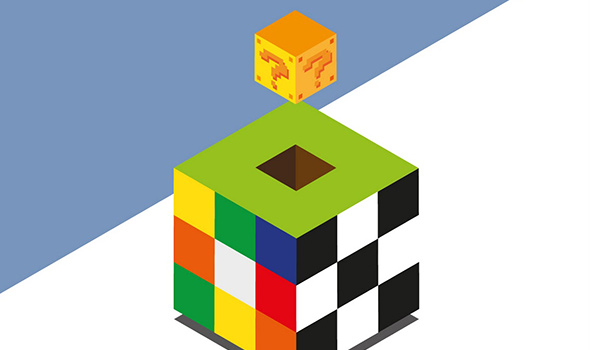Just one more level, only this last jump, a single, final mission to complete … and my, how the evening just seems to fly by! Who hasn’t faced this situation? A lot has happened since Pacman & Friends came to town. Upcoming at the Ars Electronica Center is an intensive encounter with computer gaming, and thus a great opportunity to meet & greet others who share this “hobby” or to rekindle a passion you though had flamed out long ago.

Computer games have finally arrived in the social mainstream. This is attested to by, among other things, the huge profits they generate. For years now, computer gaming has been the revenue leader among content industries; films and music don’t even come close. On one hand, this yields numerous advantages since there are more and more development studios able to invest increasing amounts of money in outstanding products. But, as is so often the case, there are also lots of developers who prefer to stash the cash and invest their efforts in hyping players on the same old game in a snazzy new package. We’re all familiar with the Hollywood sequel mentality; in the gaming scene, this is being taken to a whole new level. Does anybody even know how many Call of Duty games there are at this point?
Now, business considerations have come to exert such a powerful influence on the game development process that it’s even changing gaming concepts. So we’re repeatedly confronted by games that are distributed free of charge, but actually playing one such game successfully to completion calls for digging deep into your wallet. They call it Free to Play (F2P) and it sure sounds cool at first!
Since the outbreak of World of Warcraft at the very latest, subscription models whereby players immerse themselves in a gaming universe for a fixed monthly fee have displayed their awesome power to extract prodigious quantities of currency from enthusiasts’ credit card accounts.
It should be kept in mind that these models also come with constraints and restrictions (for example, digital rights management, ORIGIN and persistent online authentication; consider Diablo III) and this has also been a source of discontent in the gaming scene. After all, these constraints influence game development to a great extent, and a few game series have already been modified beyond recognition.
Journey, one of the indie-hits of 2012
In addition to the major publishing studios, we’ve also witnessed the emergence of numerous indie developers , individuals or small crews who develop games as they see fit and without financial constrictions. In this market sector above all, there are more and more developers taking leave of their accustomed turf, helping themselves to material from films and other art forms and, increasingly, their creations become works of art in their own right that aren’t just out to provide entertainment but also impart a certain experience and convey a particular message. But in all fairness, it should also be mentioned that these indie projects would hardly have an audience to reach if it weren’t for the financial muscle of the big studios because the audience as a whole would simply be too small.
So, when it comes to finances, computer games are definitely big boys now. But how do things look in other respects?
Not all that long ago, computer games were strictly for kids, and grown-ups who let themselves be seen at a console became objects of sniggering derision. But lately, this too has changed. After all, who nowadays doesn’t have some sort of diversion installed on his/her smartphone—Angry Birds, maybe an SNES emulator or a football manager, a Farmville derivative or a little Tower Defense game?
Facebook and Google+ have their own game centers in which hundreds of thousands of games await discovery. And millions of people take advantage of these offerings. But, hey, wait a second, I just gotta go shear the sheep, I’ll be right back …
Facebook and Google+ have their own game centers in which hundreds of thousands of games await discovery. And millions of people take advantage of these offerings. But, hey, wait a second, I just gotta go shear the sheep, I’ll be right back …
The first focal-point theme at Gamestage@AEC will deal with another significant facet of computer gaming: competitive games.
EVO 2010: Super Street Fighter IV Finals, quite some atmosphere…
In this day and age, it’s possible to make money not only as a developer or producer of computer games but also as a professional player. At the AEC, Gamecraft, the Linz gaming community, will give a rundown on what it’s like to play in a competitive environment and, together with Radiated Pixel and experts from the Upper Austria University of Applied Sciences’ Hagenberg Campus, invite guests to jointly explore gaming domains and engage in a bit of sporting competition.
For those who’d like to practice beforehand: we recommend StarCraft II, the successor of the most popular strategy game of all time. Despite the advent of a next generation, the original StarCraft still has millions of fans, especially in the pro gaming domain. StarCraft II initially had to sort out problems having to do with game balance, and the fans were not pleased at all; nevertheless, in the competition sphere, it sets a new standard. Virtually no other game offers as many possibilities, emphasizes both micro-management (i.e. coordinating individual units) as well as macro-management, and thus forces players to act quickly and to invest lots of time in learning and practice. Blizzard’s blockbuster is the star of the show on Friday. Sufficient time will be provided to get acquainted with the material.
StarCraft II in perfection
Future installments of Gamestage will provide insights into the history of video games, organize outings into the world of consoles, showcase collectors’ items, and lots more. For people who are into stuff like this—and let’s face it: who isn’t?—Gamestage@AEC is definitely a don’t-miss event!